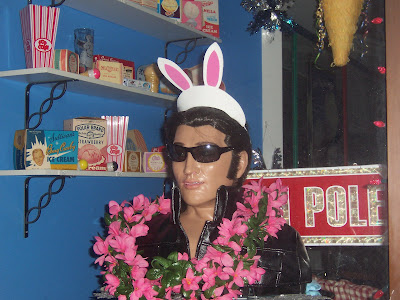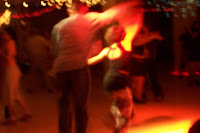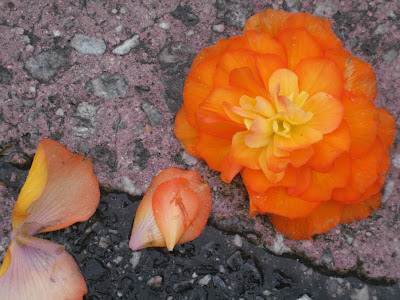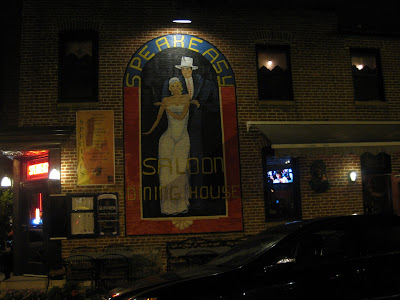A clip of Kim Nalley with Tammy Hall on piano joining the Houston Person Quartet at Frankie 95 in NYC for rendition of "Swing Brother Swing."
Tuesday, September 08, 2009
Friday, July 10, 2009
Elva Ramirez created a video blog "They're Still Doing the Lindy Hop" for the Wall Street Journal on the lindy hop renaissance. Ms. Ramirez is also a lindy hopper.
Saturday, July 04, 2009
Friday, June 12, 2009
Thursday, June 04, 2009
Frankie Manning - Never Stop Swingin'
Watch the entire documentary of Frankie Manning: Never Stop Swinging here on the SundayArts Web site, also to air on May 24th for SundayArts on THIRTEEN.
The documentary features the last major interview of Frankie Manning before his death, as well as precious archival footage of his dancing from the 1930’s to 2009 in New York, Hollywood, Sweden, France, Italy and Singapore. Footage highlights include scenes of Manning’s birthday parties, where he danced with one woman for each year he’d been alive, the legendary dance scene choreographed and headlined by Manning for the film “Hellzapoppin,” and the phenomenal duet with his 76-year-old son, Chazz, himself a professional dancer. Frankie was a born storyteller, with a huge smile and an even bigger laugh.
“Frankie Manning was a man who truly LIVED every moment of his life,” said Julie Cohen, director of the documentary. “Having spent the past two months watching hundreds of hours of footage of him dancing from the 1930’s to the present, I’ve seen the joy he took in every step.”
As a teenager, Manning started dancing in the best venues in Harlem, including the legendary Savoy Ballroom. He became a member of Whitey’s Lindy Hoppers, the energetic, immensely talented group that made the dance a national phenomenon. As a young man, Manning traveled the world, and entertained on stages with Count Basie, Duke Ellington, Ella Fitzgerald and Billie Holiday. The group developed a large international following, even as they fought the racial prejudice that often barred them from sleeping at the hotels where they performed, or eating in the restaurants where their cabaret act brought in big profits.
Frankie’s performances were captured on film in a number of Hollywood movies. His dance sequence in “Hellzapoppin” is still considered the great swing dance number of all time. And it’s not just the oldtimers who enjoy it; the clip has more than million hits on YouTube. Frankie wasn’t just a dancer; he was a choreographer too, although no one called him that at the time. He devised many of the acrobatic “air steps” that made his Lindy Hopping troupe such a huge attraction.
Frankie stopped dancing for a few years to serve in the Pacific in World War II, then picked it up again after he returned home from the war. When the swing dancing craze died down in the 50’s, Frankie got a day job: he worked in the post office for thirty years. Then in the late 80’s when swing came back into fashion, so did Frankie. He was one of the choreographers of the Broadway smash Black and Blue, for which he won a Tony Award. He also did choreography for Spike Lee’s Malcolm X.
Frankie Manning: Never Stop Swinging, is a half hour documentary produced and directed by Julie Cohen, the producer of the hugely popular shows The Jews of New York and New York Goes to War. The program will also feature an interview with Ruthie Rheingold, a 92 year old Jewish woman, who along with her partner Harry Rosenberg made up the only white couple to dance in Whitey’s Lindy Hoppers, and a reunion between Frankie and Ruthie, caught on film.
http://www.thirteen.org/sundayarts/frankie-manning-never-stop-swinging/291
Friday, May 22, 2009
Frankie Manning - Never Stop Swingin'
“Frankie Manning: Never Stop Swinging”: New Documentary Chronicles Life of Dance Legend Known as the “Ambassador of Lindy Hop”
Guest: Julie Cohen, writer, producer and director of the new documentary Frankie Manning: Never Stop Swinging, which will premiere tonight on Ch. 13 in New York.
JUAN GONZALEZ: We end today’s show looking at the life of legendary swing dancer Frankie Manning, known as the Ambassador of the Lindy Hop. He died last month at the age of ninety-four. During a career spanning eight decades, Frankie Manning’s influence on the dance floor was felt around the world.
A new documentary about his life premieres tonight on WNET-Channel 13 here in New York. It is titled Frankie Manning: Never Stop Swinging. In a moment, we will be joined by the film’s director, Julie Cohen, but first an excerpt from the film.
NARRATOR: Within weeks, Frankie could mimic George’s steps. Soon, he was inventing moves of his own.
FRANKIE MANNING: Sometimes you just hear a riff in music, you know, like about something like, say, jum-pum-dun-bum-bum-daan. And you just try to—OK, what does that sound like? Jum-pum-dun-bum-bum-duun. And that music is saying to you, “Hey, do this, man.”
JULIE COHEN: Did you think of yourself as a choreographer?
FRANKIE MANNING: Ah, no. No, I didn’t think of myself as a choreographer or anything like that. I just danced.
NARRATOR: Inspired by Shorty George’s famous lift, Frankie approached a dance partner with an idea.
FRANKIE MANNING: I want to pick you up on my back, and I want you to roll over my back. I want it to be a step, a continuous movement, where you get on a back and you keep rolling and come down in front of me.
NARRATOR: It was the first of many aerial moves. He called them air steps, and that would become Frankie’s trademark. Frankie and the other young dancers from Cat’s Corner, now known as Whitey’s Lindy Hoppers or Whitey’s Hopping Maniacs, started getting gigs up and down the Eastern Seaboard and at the hottest venues back home.
ANNOUNCER: This program is coming to you from the Cotton Club in Harlem, New York City.
JULIE COHEN: How big a deal was it to dance at the Cotton Club?
FRANKIE MANNING: Whoa, are you kidding? Only the best in the entertainment world worked at the Cotton Club—Cab Calloway, Duke Ellington—and to work with these people in the same show with them, oh, man.
NARRATOR: The bands may have had the big names, but it was the dancers, with their lightning-fast acrobatic style, that electrified audiences wherever they went.
CHAZZ YOUNG: Wild, fantastic girls being thrown everywhere. It was just the most exciting thing that I had ever seen.
NARRATOR: Even as Frankie became a celebrity Uptown, there were still doors that were closed to him and the other Lindy Hoppers, because there were black. He remembers a night in the 1930s, when he and a group of dancing buddies went to see a big band show at the Roseland Ballroom in Midtown Manhattan.
FRANKIE MANNING: When we got down there to go in, the guy wouldn’t let us in. You know, so he said, “Well, you can’t come in.” And I’m kind of hard-skinned, you know, like—or tough skin, I should say, and it just rubbed off my back.
NARRATOR: On tour, things were worse. Many of the clubs that profited from the group’s performances wouldn’t let them in as customers. After the Lindy Hoppers did a knock-out opening number for Billie Holiday and the Count Basie Orchestra at a Boston hotel, they sat down to watch the rest of the show.
FRANKIE MANNING: One of the waiters came over and told us we couldn’t sit there, you know. So we went on back to our room.
NARRATOR: When they told Holiday what had happened, she went and talked to the hotel management.
FRANKIE MANNING: She said, “Well, if these kids can’t come out and hear me sing, then I’m not going to sing anymore.” Eventually, the management said, “Well, OK, we’ll set up a table for them to sit at.” You know, ordinarily, you know, we might not have gone out like every show to hear her sing, but since they didn’t want us out there, we said, well, we’re going to be there. So we went out every night and just sat at the table and listened to her sing.
AMY GOODMAN: Frankie Manning, from the documentary Frankie Manning: Never Stop Swinging. This is Democracy Now!, democracynow.org, the War and Peace Report. Julie Cohen, the writer, producer and director of the documentary, is here. It’s airing tonight in New York on WNET, tomorrow at thirteen.org all over the country.
Julie, the obstacles that he faced?
JULIE COHEN: Well, you saw there that Frankie and his whole troupe, Whitey’s Lindy Hoppers, had just sort of an incredible situation to deal with, where they were being invited and in fact making money for a lot of nightclubs, restaurants, hotels all over the country, places that wouldn’t then seat them just to come in and enjoy a program.
The amazing thing about Frankie was the way he chose to just kind of push past the situation and see things in a positive light. You know, there’s a swing song from his era, “Accentuate the Positive, Eliminate the Negative,” and that’s really the way Frankie lived his life. He managed not to hold racial prejudices himself and in fact became quite close friends with a white couple who danced in his troupe, Whitey’s Lindy Hoppers, in Harlem. And his view of that was, you know, “We didn’t look at people and see black or white; we looked at their feet and said, ‘Can you move them feet?’” If someone was a good dancer, they were OK with Frankie. If they could swing.
AMY GOODMAN: Well, we look forward to seeing the whole thing tonight on WNET, 10:30 in New York. Rest of the country, thirteen.org, starts tomorrow. Thank you so much, Julie, for joining us. Julie Cohen is the director, the writer, the producer of Frankie Manning: Never Stop Swinging.
Monday, May 18, 2009
Kashyapa's Smile
Friday, May 15, 2009
If the World Was Crazy

If the World Was Crazy
If the world was crazy, you know what I'd eat?
A big slice of soup and a whole quart of meat,
A lemonade sandwich, and then I might try
Some roasted ice cream or a bicycle pie,
A nice notebook salad, an underwear roast,
An omelet of hats and some crisp cardboard toast,
A thick malted milk made from pencils and daisies,
And that's what I'd eat if the world was crazy.
If the world was crazy, you know what I'd wear?
A chocolate suit and a tie of eclair,
Some marshmallow earmuffs, some licorice shoes,
And I'd read a paper of peppermint news.
I'd call the boys "Suzy" and I'd call the girls "Harry,"
I'd talk through my ears, and I always would carry
A paper umbrella for when it grew hazy
To keep in the rain, if the world was crazy.
If the world was crazy, you know what I'd do?
I'd walk on the ocean and swim in my shoe,
I'd fly through the ground and I'd skip through the air,
I'd run down the bathtub and bathe on the stair.
When I met somebody I'd say "G'bye, Joe,"
And when I was leaving--then I'd say "Hello."
And the greatest of men would be silly and lazy
So I would be king...if the world was crazy.
Shel Silverstein
Thursday, May 14, 2009
Midnight Dancer
Saturday, April 11, 2009
Saturday, March 21, 2009
Frankie is Savoy
Savoy
Behold!
Frankie is Savoy. The bond
Of silence is upon him.
Old
And deep with memories, of slights and scorn,
And trampled on, yet all untamed;
All aged now, yet unbowed, --
The master of the young dance's prime,
Whose rhythms still laugh at Time,
And lifts to heaven the joy of movement,
Rests satisfied upon his fame.
Who shall say:
I taught swing to fly;
And fought abroad to preserve a freedom
I did not have at home,
Give it all up for family and community,
Then returned to teach the world to swing?
Yea, voices mutter about idle comparisons;
Singing of fast feet and celluloid fame,
New-born and known but yesterday.
--"Rhythm in Exile", Eshu Obatala
Behold!
Frankie is Savoy. The bond
Of silence is upon him.
Old
And deep with memories, of slights and scorn,
And trampled on, yet all untamed;
All aged now, yet unbowed, --
The master of the young dance's prime,
Whose rhythms still laugh at Time,
And lifts to heaven the joy of movement,
Rests satisfied upon his fame.
Who shall say:
I taught swing to fly;
And fought abroad to preserve a freedom
I did not have at home,
Give it all up for family and community,
Then returned to teach the world to swing?
Yea, voices mutter about idle comparisons;
Singing of fast feet and celluloid fame,
New-born and known but yesterday.
--"Rhythm in Exile", Eshu Obatala
Friday, March 20, 2009
Tuesday, March 10, 2009
Monday, February 09, 2009
I have a practice

I have a practice I use sometimes.
I don't dance to fast big band, I don't not dance to fast big band.
I don't do any patterns, I count no higher than me and you.
I just embrace my sweetie, drown in her eyes, follow the music.
This method can be used anywhere, anytime, does not require a particular
kind of music, dance floor, or clothing, and is truly effortless.
Thus dance becomes play.
-- Techniqueless Old Smoothie
Sunday, February 08, 2009
Basie Swings
This Is Just To Say
that Count Basie
is the real
king of swing
with jo jones & freddie green
set the rhythmm free
and lester young
will always be prez
Forgive me
they swing so sweet
so hot
both yesterday
and today
variations on WCW
that Count Basie
is the real
king of swing
with jo jones & freddie green
set the rhythmm free
and lester young
will always be prez
Forgive me
they swing so sweet
so hot
both yesterday
and today
variations on WCW
Thursday, February 05, 2009
Ad for a Dance Partner

Ad for a Dance Partner
Must be someone I can like and respect
And who likes and respects me for me.
[Mutual attraction and respect
absolutely required]
And trust too.
Say, for example
That after a breakaway
you'll be ready to start
on phrase.
Someone who will carry their own weight
Yet will be there to provide support
when needed.
[Baby I can't leverage without you.]
Someone's who adult
yet not afraid
to let the little kid out
and play with me.
And yeah, did I mention true.
When we're dancing,
it's all about
me and you
Only.
Tuesday, February 03, 2009
-Jazzman-
J a z z m a n
(for Jayne Cortez)
you blow your soul through gold trumpets
whisper your flutters through the flute
you are sweet tonic mix of arpeggio and wine
how I wish you would play me that way/
that way you strum them strings under
ebony blue light smoky haze
that way how you moan soprano screams
in syncopated time
jazzman, each part of my body be a different instrument:
my leg: a saxophone
my spine: the piano
the soles of my feet: the drum
everything else babe is bass
by Jennifer E. Smith
Funky Butt Jass Dance Hall
Funky Butt Jass Dance Hall
ken burns jazz
started with buddy bolden at
the Funky Butt Dance Hall
it started earthy,
hope it stays there
started with improvisation
and individuality. with deep
deep roots in the blues.
blues, a simple structure, yet
art beyond just skill
cause it’s all about a feeling.
the feeling of a people who
chose to be joyful in a
sorrowful world. a new world,
with new relationships. or was it
so new.
‘what did we do to be so black and blue’
dissonance a way of life
in america. just playing the
natural feelings of a people
we kind of blue, but there’s
a trane a coming.
the shape of jazz to come? huh?
ornette, who is that lonely woman
she should be fine and mellow.
listen to Pres, it’s in the tilt
of his horn. hawk knows, cause
we love you baby, body and soul
listen to buhaina, he got the message.
meet me at the chicken shack
5am breakfast dances, saturday
night fish fries, rent parties
shout and holler, swing low
sweet cadillac, rhythm coming
for to take us back to the
funky butt jass hall.
–tm
Tuesday, January 27, 2009
Breakfast at Valerie's
Breakfast at Valerie's
Be sure to stay for the after party
cause the bluesing don't start
till after midnight when
the breakfast club crowd
starts to gather in the workshop
where the only glow is
moonlight and candles
and everyone came to
party till dawn
when breakfast is served
on the patio overlooking the lake
and the rising sun
Be sure to stay for the after party
cause the bluesing don't start
till after midnight when
the breakfast club crowd
starts to gather in the workshop
where the only glow is
moonlight and candles
and everyone came to
party till dawn
when breakfast is served
on the patio overlooking the lake
and the rising sun
Monday, January 26, 2009
Dancing with My Baby
I will be the gladdest thing
Under the sun!
I will smile at a hundred cuties
And not pick one.
I will look at Divas and Swedes
With quiet eyes,
Watch the leaders queue up for Virginie,
And see her smile.
But when the music begin to play
Straight from lindy hop heaven,
I will take my baby's hand,
And invite her to the dance!
apologies to ESVM
Sunday, January 25, 2009
I ain't seen
I ain't seen no poems stop a .38,
I ain't seen no stanzas brake a honkie's head,
i ain't seen no metaphors stop a tank,
I ain't seen no words kill
& if the word was mightier than the sword
Pushkin wouldn't be fertilizing russian soil
& until my similes can protect me from a night stick
I guess i'll keep my razor
& buy more bullets.
Don L. Lee (Haki R. Madhubuti)
Subscribe to:
Posts (Atom)


